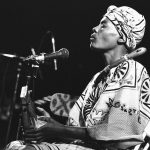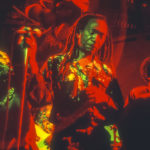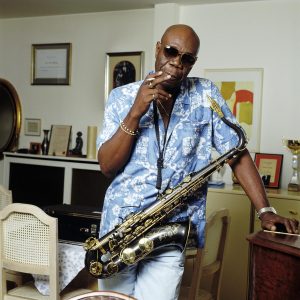Chiwoniso Maraire’s ancient voice muffled too soon
The Zimbabwean mbira player and chanteuse died tragically young at 37, before she had fulfilled her vast potential. Her legacy, however, lives on.
Author:
6 May 2020

Chiwoniso Maraire was a singular talent of the 1970s generation, blessed with a moving voice that reached into your heart. Resonator in hand, with her mbira securely ensconced inside, her songs told the stories of modern Zimbabwean urban life. Her music changed lives and influenced a whole generation of performers who followed in her footsteps. This makes her untimely death at 37, in July 2013, that much more devastating as it robbed Zimbabwean music of a shining diamond and a musical revolutionary who helped reimagine a whole culture’s relationship with the mbira.
Maraire was that rare musical superstar who remained humble and grounded in spite of global stardom. To many of her fans, she was just Chiwoniso, Sister Chi, or simply Chi. Through a seemingly alchemical process, she composed and performed songs for a younger generation of Zimbabweans, who grooved effortlessly to her modern take on the ancient, traditional mbira instrument. Maraire would step on stage, a vision in a designer Countess K dress, her locks framing her face while making the mbira issue forth songs of love and loss. More than any artist before her time, she brought the mbira into the 21st century. She made the instrument cool for people of our generation.
Related article:
I don’t remember the first time I met Maraire. I vaguely remember hanging out with her as a teenager at a friend’s house in the early 2000s. I remember watching her, in 2012, jump on stage to perform with my favourite mbira punk band, Chikwata.263, at the Harare International Festival of the Arts. Later that year, I remember her loudly protesting in the back seat of a friend’s car as we tried to take her home. She wanted to stop for one more drink at a notorious local pub, Londoner’s Sports Bar, which was usually the last stop at the end of the night for Harare’s drunken revellers.
The first time I and many others heard her sing was the sweet lilt of her voice in the chorus of the hit song From The Native Tongue by A Peace of Ebony on Radio 3 in the early 1990s. Founded in 1992 by friends Herbert Schwamborn and Tony Chihota, Peace (Positive Existence Allowing Cultural Expression) Of Ebony was the first Zimbabwean rap group to release a commercial album to local and international acclaim. Rapper Schwamborn recalls hanging out with Chihota at fast-food outlet Chicken Inn on Inez Terrace in Harare’s CBD when he first heard Maraire beatboxing and singing off the cuff. Impressed, they invited her to add vocals and record tracks for their album From The Native Tongue. Maraire features on the title track, her vocal contribution bold, melodic and sure. Their follow-up single, Pretend It Never Happened, also did well on the local charts. But it was the title track and album that had a huge impact in Zimbabwe and South Africa, where it was released by the now defunct Teal Trutone Music.
Precocious genius
Maraire was very young then – only 15 – and had just moved to Zimbabwe from the United States, where she was born and her parents had been based. Freshly transplanted to Zimbabwe, Schwamborn remembers that he and Chihota had to visit her father, renowned mbira and marimba professor Dumisani Maraire, to ask permission for his daughter to join the band. He was a familiar face in ethnomusicology departments in the US, and was friends with many South Africans exiled there, including trumpeter Hugh Masekela.
“[Maraire was a] very young, spirited woman. Very independent. Chi seemed like she was always in a constant state of meditation. She was always just so mellow. Nothing ever fazed Chi. In my whole history of knowing Chi I have never seen her angry. Never seen her cry. She was always very peaceful all the time,” says Schwamborn.
Related article:
From The Native Tongue, released in 1991, was the hit album that introduced Maraire to Zimbabweans and the world. Schwamborn says the album was inspired in part by the native tongue movement coming out of New York. “We just said hey, they are trying to be what we are,” he says, referring to performers such as De La Soul, The Jungle Brothers, A Tribe Called Quest, Queen Latifah and others.
In 1994, A Peace of Ebony won the Best New Group out of Southern Africa award in the Radio France International Discovery contest for Vadzimu, a rap track with Shona and French lyrics. It was again Maraire’s voice, melodic and clear as a bird’s, that stood out and made people sit up and pay attention. But even though she began to gain momentum as a singer in her late teens in Zimbabwe, this was not her first time as a performer in the spotlight.
Child of Chimanimani
Growing up in a musical family whose ancestors hailed from Chakohwa in the mountains of Chimanimani near Mozambique, Maraire was bound to have some music in her. She learned to play mbira from her father. Her four siblings, Tawona, Ziyanai, Dumisani and Rusununguko (now deceased), took part in the playing and learning too. Her younger sister Tawona says: “Baba [father] taught us – me, Chiwoniso, Ziyanai and Rusununguko – how to play marimba. But it was Chiwoniso and Rusununguko who were more interested in the mbira at a young age. Ziyanai and I performed with Baba and Chiwoniso in Mhuri yaMaraire [The Maraire Family], which was our mbira group. Ziyanai played hosho [shakers] and I played ngoma [drums] while Baba and Chiwoniso played mbira.”
It was clear from the outset that the Maraire children had music running through their veins. Younger brother Tendai found success with the Seattle-based hip-hop groups Shabazz Palaces and Chimurenga Renaissance. Half-brother Dumisani Jr has had a successful career in music too, recently releasing an album called African American. But it is Maraire who translated this early exposure to playing the mbira – combined with her innate and undeniable talent – to widespread international critical acclaim.
Renowned poet and frequent collaborator Chirikure Chirikure says of Maraire’s relationship with her father: “She was very close to the heart of her father. Dumi really, really loved her. It’s very unfair to say maybe she was the favourite among all of the siblings, but it was very clear. She also very well loved him and she respected him. They would go around pretty much like siblings, not like father and daughter.”
Related article:
Maraire taught his daughter how to play the nyunga nyunga mbira, a more modern version of the ancient mbira carried forth through the generations by our ancestors. The nyunga nyunga (Shona for sparkle sparkle) is unlike the nhare mbira, which has a wider range of notes and keys. In Maraire’s hands, the nyunga nyunga did indeed sparkle as she drew her audiences into a trance-like state common when listening to mbira music.
Legendary producer Keith Farquharson, who played keyboard in the 1980s Zimbabwean superband Ilanga, produced From The Native Tongue. But Peace of Ebony disbanded soon after they released Vadzimu with Schwamborn (now known as Metaphysics) and Chihota (now known as Tony Capone) pursuing solo rap projects. Not long after the disbandment, Farquharson invited Maraire to lay down vocals on music he was producing for former Ilanga band mate and guitar maestro Andy Brown and his band, The Storm.
The ballad of Maraire and Andy Brown
Farquharson recalls: “It was very easy to work with her – she was always full of great ideas and it was a wonderful thing to see her develop and mature as a musician. She nearly always nailed her vocals on the first take. I was recording Gondwanaland with Andy Brown at the time and told him I wanted to use Chi for some of the backing vocals. He told me that he didn’t think she could sing in tune! I insisted – and she ended up in his band and became his wife.”
Maraire began to sing backing vocals for Brown as well as collaborating with him as a band member of The Storm. Most agree that Brown heavily influenced Maraire’s musical direction as she began to come into her own as a solo performer. She influenced him too. A critically and commercially acclaimed musical genius in his own right, Brown was a maverick musician who played his part in shaping music in Zimbabwe. Along with The Storm, the two went up and down performance venues all over the country, from Harare’s urban posh venues north of Samora Machel Avenue (the thoroughfare which splits Harare in two: north and south, rich and poor) down to the country’s rural growth points and beyond on global tours. A master musician and producer, Brown played a significant role in Maraire’s musical development and in her personal life.
As creatives, they inspired each other, and it was not long before a musical collaboration turned into a passionate romance. Soon Maraire was pregnant with their first child, Chengeto, and Brown paid lobola in spite of her father’s objections to the union. Two years later, their second daughter, Chiedza, was born. But it was not all roses, as Maraire and Brown had a notoriously tumultuous relationship, with allegations levelled against him of physical and emotional abuse.
Of her parents, Chengeto Brown says: “My father was a great man. He was also a flawed man. My mother was a great woman. She was also a flawed woman. They were just some very powerful individuals, on a mental level and on a spiritual level. They were just some very powerful beings. When they came together sparks flew, but you don’t want those sparks to burn the building down! They met each other in the wrong lifetime, but they were definitely soulmates. They had a real respect for each other’s musical capabilities.”
Their passionate relationship lit a creative fire that gave us Maraire’s debut album, Ancient Voices. Released in 1998, Ancient Voices was a ground-breaking record that merged Maraire’s mbira skills and extraordinary vocals with Brown’s mastery of the guitar. Combined with Farquharson’s production, the results were the now classic tunes Mai, Wandirasa, Ivai Nesu and Nhemamusasa. The plaintive Mai, a mid-tempo number, was an ode to her mother, Linda Chengeto Maraire, who died in 1997. With Nhemamusasa, the traditional mbira tune is creatively reimagined with Brown’s omnipresent guitar riff, joyful trumpets and percussion. The plaintive and emotive Ivai Nesu is a favourite of many, and the song of love and loss Wandirasa was also a standout hit.
Of her songs, Farquharson says: “She had the ability to construct beautiful vocal melodies – whether in Shona or in English – that appealed to people across all cultures. She was an incredible songwriter.”
Collaborations in live performances and studio sessions followed with a number of musicians: Kris Kristofferson, Habib Koite, Sam Mtukudzi, Max Wild, multinational group Woman’s Voice and many more. A young and then unknown Jah Prayzah walked all the way to her house in Bluffhill at the western edge of the city to ask her to play on his track Dande. To this day, many musicians speak openly of her love of collaborating with and sharing the stage with other performers.
Becoming a star in her own right
Ancient Voices put Maraire on the musical map. It heralded her break away from Brown and The Storm to pursue a solo career. On the live music performance scene, she and her ensemble were known as Chiwoniso and Vibe Culture, incorporating former band mates from The Storm: mbira player Adam Chisvo and, occasionally, Brown on guitar and Jacob Mafuleni on percussion. Martha Thom performed along with them as a solitary dancer. She also continued to collaborate with poet Chirikure Chirikure, a family friend. They first performed together in high school as part of a group called Detembira (a portmanteau of detembo – Shona for poem – and mbira). Her father performed with them. After he passed away, they continued to work together, Chirikure performing his poetry and Maraire playing mbira in accompaniment.
Explaining their collaboration on Ancient Voices, Chirikure says: “I remember I went to her house and she was sitting on the couch cross-legged playing mbira on her own. She didn’t even notice I had walked in and she was singing Mwari baba ivai nhesu, and she was playing it over and over again and kept getting frustrated, making mistakes. I said to her, ‘This is a good song.’ But she said, ‘I just have the chorus. I don’t have the body.’ I asked her if she wanted the body of the song and she said yes. So I wrote it overnight and sent it to her the next day. She looked at it and within a week she had put it together. From there on, every album of hers I would write a minimum of two songs for her.”
Ancient Voices made Maraire a star and showcased her talent as a singer and musician. She then became in demand on stages across the globe. When people would mention the top five musicians from Zimbabwe, Maraire would always be one of them, an extraordinary feat for a woman who had only just turned 21. In 1999, Radio France awarded Maraire the Decouverte Afrique for Ancient Voices. In the same year, she was also nominated for Best Female Vocals for the Kora All-Africa Music Awards. Ancient Voices entered the World Music Charts in Europe three times.
I remember being in the US in 2003, where she was scheduled to perform at the Pritzker Pavilion concert series in downtown Chicago. Unfortunately, she missed her flight and could not make it. I recall the lady who was sitting next to me – a big fan, she told me – being so disappointed that she didn’t get a chance to see Maraire perform live for the first time. It wasn’t just abroad either. In Zimbabwe she became a household name and her songs were played on every radio station. This made people familiar with her songs even if they did not get a chance to see her perform live. At music centres and colleges, budding young musicians used her songs to learn how to play the mbira.
But what was it about her that made her so unique? Her voice had the double advantage of being at once clear as a bird’s, thus lending itself well to a kind of pop sensibility, but also sounding deeply resonant when singing the most sacred traditional mbira tunes. But it was also her mastery of the nyunga nyunga mbira that captivated audiences both locally and abroad. Farquharson says: “What made Chiwoniso unique and so compelling was that she brought a fresh approach, one very much her own, to this ancient and spiritual instrument.”
Maraire is credited with revolutionising the nyunga nyunga mbira, which she knew intimately. Hector Mugani, ethnomusicologist and mbira player for Chikwata.263, explains that it was not only her natural talent that made Maraire’s music so unforgettable, but her technical knowledge of her instrument, her long and intimate experience with it growing up in the shadow of her father’s mbira brilliance, as well as having studied music at the Zimbabwe College of Music.
“With Chi, her sweet spot vocally on a musical scale was F-sharp. Her mbira nyunga nyunga was tuned to F-sharp … most people don’t do that. Her voice sits very comfortably on F-sharp, which would make it easier for her to sing effortlessly. Her tone was naturally F-sharp. Usually in music you do the simplest things that make you shine. She knew herself musically very well,” says Mugani.
Jamming at the café
Maraire had a regular Tuesday evening slot at arts and culture venue The Book Cafe, where her live shows were billed as Chiwoniso and Vibe Culture. It was her spiritual home. I remember watching her perform there one evening in the early 2000s: standing in front of the crowd composed, spiritually zen, in her Countess K dress with its classic denim and ankara print design. Young, slightly tipsy men were sitting in the front row, singing along and dancing to each song. One was so inspired that he pulled out a $10 note, moved on to the stage and calmly thrusted it down the front of her dress. Shocked by such a brazen act, I watched as Maraire composed her face and continued the show seemingly unfazed, eyes closed, her fingers gently plucking the mbira in her resonator.
As a performer, Maraire inhabited the stage, bringing a spiritual presence that was sultry and mesmerising. Former Book Cafe multimedia officer Rudo Chakanyuka recalls one of her performances: “There was this one show she did, Poetry Africa 2010. I think it was a Saturday night. By the time Chiwoniso’s set came, everybody was well lubricated, people were making noise and the whole atmosphere was just loud. And then she just came on and she sang Kurima. And I swear there was not a person in that room who did not have goosebumps. I don’t know if it was the sound system – it just sounded perfect. I have never heard a more perfect performance. And everybody, whether they were on the floor dead drunk, sobered up. Her performance was just mesmerising. I don’t know what it was. Everybody stopped what they were doing, stopped dead in their tracks and went quiet. Drinks were put down. You were just listening to her.”
Related article:
With musical success came fame. Everywhere Maraire went, people recognised her. “Sister Chi!” they would cry, and she would turn, her face shifting into a slow smile. She always had time for her fans, who would be shocked and bewildered at her easy attention and then eagerly buy her drinks in tribute. Some would show up at her home, bringing chicken, alcohol and other gifts. Some of these fans would later become friends who would come to hang out at her house, sit at her bar and drink, talk, laugh and play music.
Married no more
Even as her love life with Brown was falling apart behind the scenes, to the world she was variously a superstar, a mother, a friend, a wife, a woman who had lost both parents making a living in Robert Mugabe’s Zimbabwe. Those who knew her best say she was kind and loving, unassuming, and even at the height of her fame she was happy to travel by kombi (public taxi) sitting at the very back, quietly engrossed in a book. Few outside her inner circle knew of her love of books and reading. Designer and close friend Alice Knuth of fashion label Countess K says: “She was very intelligent. She read a lot. She would always have a book in her hand when she wasn’t performing. When she was home she would walk around reading any old thing, whatever she found.”
After five years of marriage, her relationship with Brown irretrievably broken down, the singer walked away. She had gestured to their fraught relationship in Wandirasa, which roughly translates to “you have thrown me away”. Those close to her say she was profoundly affected by the fallout. Chirikure observed that on tour with him in Europe soon after she was subdued, a wounded woman who took some time to regain her confidence and return to herself in the aftermath. She buried herself in show after show and began to lean heavily on alcohol, which began to affect her performance, revealing an unprofessional side that soon led to a nagging notoriety. Knuth says: “I think she was a bit lost. Her drinking was a social thing that got out of hand. I think for her it was a release. But then it took her over.”
All the while Maraire toured the world and in between she raised her daughters. Chengeto, to date, has a musical career on the up with success on the horizon, and her youngest, Chiedza, picked up the mbira at age four, proving to have a formidable talent that fiercely rivalled her mother’s.
After Brown, Maraire kept her head down, preferring to keep relationships and matters of the heart casual. But soon she began seriously dating Samm Munro, a performance poet known by his stage name, Cde Fatso. Their musical collaboration with his band, Chabvondoka, yielded the poignant track Bread and Roses, which they co-wrote. The song was written as an ode to the activists in the movement Women of Zimbabwe Arise, who in the 2000s would protest in the streets on Valentine’s Day, in the face of grim-faced riot police, demanding bread and roses (a metaphor for love and dignity) from Zimbabwe’s increasingly oppressive government.
A legacy of generosity
In answer to calls from fans and from within herself to have the mbira feature more prominently in her music, Maraire began work on her second album, Timeless, a project that was musically more stripped down than her first. She produced the album herself, and it’s a stunning, contemplative work. While on Ancient Voices the sound of the mbira was more in the background, on Timeless it is front and centre, hypnotic and powerful, accompanied only by traditional drums, shakers and her captivating vocals. At the end of each song you can hear the mbira, the shakers and the drum slow to a halt, as if it were a live performance. Timeless cemented her place in the Zimbabwean musical canon as the mbira queen.
Bread and Roses is just one of several songs Maraire recorded that reveal her concern for the underprivileged. To this day, street kids recall her concern and generosity, describing how she would walk into a shop and buy a loaf of bread for them to share. This passion for those less fortunate led her to record Madame 20 Cents, Tamari, In This Life and Rebel Woman, the title track of her third album. Once again, her lyrics, her voice and her mbira work together to evoke a righteousness and a sense of injustice and outrage that permeate these songs. All of them are pointed, angry and taut.
A year before her death, Chirikure found Maraire weeping while backstage in the midst of a performance at the Spanish embassy. She cried while he held her, but she would not divulge what was wrong. In 2013, friends noticed that Maraire had a lingering cough. It was only after she began having difficulties breathing that she agreed to check into South Medical Hospital in Chitungwiza, a new medical facility southeast of Harare, where her aunt worked. Close friend Knuth says the musician joked, “Guys, don’t worry, I’m just here because I’ve been over-booting,” referencing her offstage drink and partying antics. When Knuth visited her again, she saw the singer hunched over in a sitting position. “She was coughing so much that this was the only comfortable position,” Knuth says.
Related article:
After two weeks in hospital, the singer passed away on 24 July from pneumonia. A nation in shock mourned the mbira queen who seemed to go from healthy, fun-loving performer one minute to screaming headlines in every media outlet announcing her death the next. A chaotic funeral process followed in which family members did not allow her body to enter her home and spend the night, as is tradition. She was buried at her rural home in Chakohwa. At the funeral ceremony, her daughters and stepdaughter Ammara Brown sang and played her beloved mbira. Tragically, not long after this, her daughter Chiedza took her own life.
Seven years later, her songs are alive on radio still and through live performance covers and tributes by young up-and-coming artists. To this day, the song Ivai Nesu brings tears to my eyes. Like Roberta Flack’s Killing Me Softly, she spent her musical career “strumming our pain with her fingers” on her mbira. The mbira queen is gone, but her sparkle and genius transformed Zimbabwe’s musical landscape and helped usher in a new era that redefined the mbira’s place in secular spaces.





